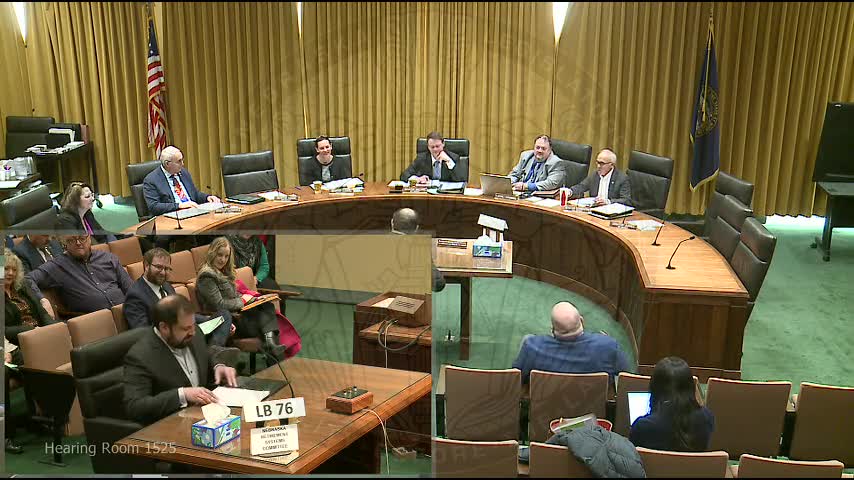Neb. committee hears testimony on LB76 to raise State Patrol survivor benefit, increase COLA cap
Get AI-powered insights, summaries, and transcripts
Subscribe
Summary
Senator Eliot Bostar introduced LB76 to the Nebraska Retirement Systems Committee, seeking to raise the surviving-spouse annuity for Nebraska State Patrol retirees from 75% to 100% and to set a uniform COLA cap of the lesser of CPI change or 4% for all members.
Senator Eliot Bostar, sponsor and chairing legislator for Legislative District 29, introduced LB76, saying the bill “makes 2 changes to the retirement benefits of members of the Nebraska State Patrol” to better compensate troopers and their families for career risks.
The proposal would increase the surviving spouse benefit from 75% to 100% of a trooper's annuity and set the annual cost-of-living adjustment (COLA) cap for retired state patrol officers at the lesser of the change in the consumer price index or 4% for all members, replacing existing tiers that capped earlier hires at 2.5% and later hires at 1%.
Supporters told the Retirement Systems Committee that the changes would address health, financial and workforce problems tied to state patrol service. Lucas Bolton, legislative representative for the State Troopers Association in Nebraska and a criminal investigator with the patrol, testified that the 4% cap “is a reasonable compromise” and said he would prefer no cap but saw 4% as a safeguard against extreme inflation. Multiple retired troopers and spouses gave personal accounts of financial strain after line-of-duty and service-related illnesses. Linda Spiegel, whose husband served 26 years with the State Patrol and later as a county sheriff, said the 75% surviving-spouse reduction was “truly disturbing” when she encountered it after her husband's death.
Senator Tony Sorrentino and others on the committee questioned the fiscal and actuarial impacts. Sorrentino asked whether the actuarial chart included both the surviving-spouse change and the COLA adjustment; the committee was told both changes were reflected and that the baseline and post-change funding levels would move from roughly a $16 million baseline to a roughly $21 million projected cost, a difference described in committee discussion as about $4.2 million. Senator Rob Clements pressed on whether the 100% surviving-spouse benefit would continue if a dependent reached age 19; a trooper representative clarified that when a child reaches age 19 the spousal benefit would drop to 75%.
Supporters framed retention as a central goal. Senator Bostar, testimony and supporters noted state patrol vacancy rates, citing 72 vacancies in 2024 out of an authorized strength of 482, and referenced research on elevated health risks for law enforcement cited during the hearing. Testifiers argued improved retirement terms could help recruitment and retention. Opponents did not testify during the oral record; the sponsor noted written support letters outnumbered opposition letters for the committee record.
The committee heard 12 written letters in support and one in opposition for the record. Committee members asked actuarial questions; no final committee vote on LB76 was taken at the hearing.
The committee closed the LB76 hearing and proceeded to other bills on the agenda.
Ending: The LB76 hearing provided detailed testimony from troopers, retirees and spouses and included committee questions about cost and funding implications. The committee did not take a vote at the hearing and will consider the bill and submitted material as it moves toward future deliberations.
